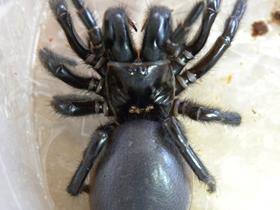
A new bio-pesticide created using spider venom and a plant protein does not harm honeybees, despite being toxic to several pests, research has found.
It was made using venom from an Australian funnel web spider and protein from a snowdrop. Researchers from Newcastle and Durham universities found the pesticide had only a slight effect on bees’ survival and no measurable effect on learning and memory.
Newcastle university’s Professor Angharad Gatehouse, project supervisor, said: “Our findings suggest that Hv1a/GNA is unlikely to cause any detrimental effects on honeybees.
“Previous studies have already shown that it is safe for higher animals, which means it has real potential as a pesticide and offers us a safe alternative to some of those currently on the market.”
During the study, bees were exposed to different concentrations of the spider/snowdrop bio-pesticide over seven days.
PhD student, Erich Nakasu, said the new combination targets an insects’ calcium channels, which are more diverse than the more commonly targeted sodium channels. He said this means it offers the potential for more species-specific pesticides.
“Calcium channels are linked to learning and memory in bees so it’s vital that any pesticide targeting them does not interfere with this process,” he added.
“Although Hv1a/GNA was carried to the brain of the honeybee, it had no effect on the insect which suggests the highly selective spider-venom toxin does not interact with the calcium channels in the bee.”
Gatehouse added: “There isn’t going to be one silver bullet. What we need is an integrated pest management strategy and insect-specific pesticides will be just one part of that.”
The study, published in the academic journal Proceedings of the Royal Society B, was funded by the Technology Strategy Board.
It is part of the wider Insect Pollinators Initiative, which is funded by the Biotechnology and Biological Sciences Research Council, Defra, the Natural Environment Research Council (NERC), the Scottish Government and the Wellcome Trust.
“If we destroy the biodiversity of pollinators then it will be irrelevant how effective our pesticides are because we won’t have any crops to protect,” said research author, Dr Geraldine Wright, head of Newcastle University’s Honeybee Lab and leader of previous research highlighting the damaging effect of neonicotinoids on bees’ ability to learn and remember.
“There is now substantial evidence linking neonicotinoid pesticides to poor performance and survival in bees and what we need now is a clear directive from the government to develop and introduce bee-safe alternatives,” she added.



